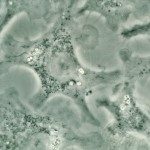Lien vers Pubmed [PMID] – 16719987
J. Endotoxin Res. 2006;12(3):151-70
Sepsis and systemic inflammatory response syndrome (SIRS) are associated with an exacerbated production of both pro- and anti-inflammatory mediators that are mainly produced within tissues. Although a systemic process, the pathophysiological events differ from organ to organ, and from organ to peripheral blood, leading to the concept of compartmentalization. The nature of the insult (e.g. burn, hemorrhage, trauma, peritonitis), the cellular composition of each compartment (e.g. nature of phagocytes, nature of endothelial cells), and its micro-environment (e.g. local presence of granulocyte-macrophage colony stimulating factor [GM-CSF] in the lungs, low levels of arginine in the liver, release of endotoxin from the gut), and leukocyte recruitment, have a great influence on local inflammation and on tissue injury. High levels of pro-inflammatory mediators (e.g. interleukin-1 [IL-1], tumor necrosis factor [TNF], gamma interferon [IFN-gamma], high mobility group protein-1 [HMGB1], macrophage migration inhibitory factor [MIF]) produced locally and released into the blood stream initiate remote organ injury as a consequence of an organ cross-talk. The inflammatory response within the tissues is greatly influenced by the local delivery of neuromediators by the cholinergic and sympathetic neurons. Acetylcholine and epinephrine contribute with IL-10 and other mediators to the anti-inflammatory compensatory response initiated to dampen the inflammatory process. Unfortunately, this regulatory response leads to an altered immune status of leukocytes that can increase the susceptibility to further infection. Again, the nature of the insult, the nature of the leukocytes, the presence of circulating microbial components, and the nature of the triggering agent employed to trigger cells, greatly influence the immune status of the leukocytes that may differ from one compartment to another. While anti-inflammatory mediators predominate within the blood stream to avoid igniting new inflammatory foci, their presence within tissues may not always be sufficient to prevent the initiation of a deleterious inflammatory response in the different compartments.

